
4
.pdf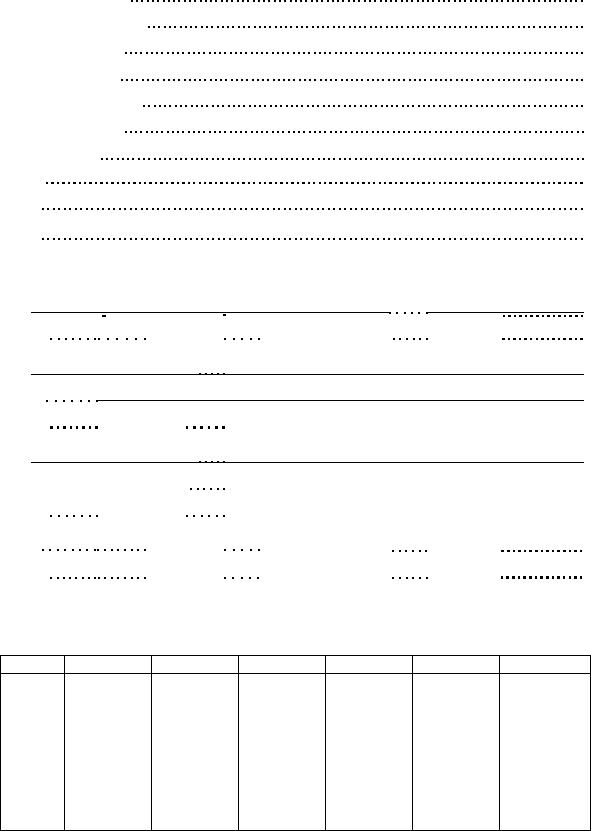
202 Useful Exercises for IELTS
LISTENING EXERCISES 4.1 - 4.9
4.1SPEED LISTENING: Note only the essential details of what you hear: (Refer to the tapescript for confirmation.)
a.London is
b.The Romans
c.The city
d.London
e.The Houses
f.The City
g.Most
h
i
j
4.2 NUMBERS AND LETTERS: (Refer to the tapescript for confirmation.)
c
D
i. . . . . ii. |
|
|
|
|
|
|
|
|
|
|
|
|
|
|
|
|
|
|
|
|
|
|
|
|
|
iii. |
.. |
|
iv |
|
|
|
|
|
|
|
|
|
|
|
|
|
|
|
|
|
|
|
|
|
|
|
|
|
|
|
|
|
|
|
|
|
v |
|||||||||||||||||||||||||||||||||||||||||||||||||||||||||||||||||||||||||||||||||||||||||||||||||||||||||||||
|
|
|
|
|
|
|
|
|
|
|
|
|
|
|
|
|
|
|
|
|
|
|
|
|
||||||||||||||||||||||||||||||||||||||||||||||||||||||||||||||||||||||||||||||||||||||||||||||||||||||||||||||||||||||||||||||||||||||||||||||||||||
vi |
|
|
|
|
|
|
|
|
|
|
|
|
|
|
|
|
|
|
|
|
|
|
|
|
|
|
|
|
|
|
|
|
|
|
|
|
|
|
|
|
|
vii. |
|
|
|
|
|
|
|
|
|
viii. .. |
... |
ix |
|
|
|
|
|
|
|
|
|
|
|
|
|
|
|
|
|
|
|
|
|
|
x |
|
|
|
|
|
|
|
|
|
|
|
|
|
|
|
|
|
|
|
|
|
|
|
|
|
|
|
|
|
|
|
|
|
|
|
|
|
|
|
|
|
|
|
|
|
|
|
|
|
|
|
|
|
|
|
|
|
||||||||||||||||||||||||||||||||||||||
i |
ii |
|
|
|
|
|
|
iii. ... |
|
|
|
|
|
|
|
|
|
|
|
|
|
|
|
|
|
|
|
|
|
|
|
|
|
|
|
|
|
|
|
|
|
|
iv. . |
|||||||||||||||||||||||||||||||||||||||||||||||||||||||||||||||||||||||||||||||||||||||||||||||||||||||||||||||||||||||||||||||||
v |
|
|
|
|
|
|
|
|
|
|
|
|
|
|
|
|
|
|
|
|
|
|
|
|
|
|
|
|
|
vi. .. . |
|
|
|
|
|
|
vii |
|
|
|
|
|
|
|
|
|
|
|
|
|
|
|
|
|
|
|
|
|
|
|
|
|
|
|
|
|
|
|
|
|
|
viii |
||||||||||||||||||||||||||||||||||||||||||||||||||||||||||||||||||||||||||||||||||||||||||||||||||||
ix |
|
|
|
|
|
|
|
|
|
|
|
|
|
|
|
|
x |
|
|
|
|
|
|
|
|
|
|
|
|
|
|
|
|
|
|
|
|
|
|
|
|
|
|
|
|
|
|
|
|
|
|
|
|
|
|
|
|
|
|
|
|
|
|
|
|
|
|
|
|
|
|
|
|
|
|
|
|
|
|
|
|
|
|
|
|
|
|
|
|
|
|
|
|
|
|
|
|
|
|
|
|
|
|
|
|
|
|
|
|
|
|
|
|
|
|
|
|
|
|
|
|
|
|
|
|
|
|
|
|
|
|
|
|
|
|
|
|
|
|
|
|
|||||||||||||||||||||||||||||||
i |
ii |
|
|
|
|
|
|
iii. ... |
|
|
|
|
|
|
|
|
|
|
|
|
|
|
|
|
|
|
|
|
|
|
|
|
|
|
|
|
|
|
|
|
|
|
iv. . |
|||||||||||||||||||||||||||||||||||||||||||||||||||||||||||||||||||||||||||||||||||||||||||||||||||||||||||||||||||||||||||||||||
v . . .. |
vi |
|
|
|
|
|
|
|
|
|
|
|
|
|
|
|
|
|
|
vii. ... |
|
|
|
|
|
|
|
|
|
|
|
|
|
|
|
|
|
|
|
|
|
|
|
|
|
|
|
|
|
|
|
|
|
|
viii. |
|||||||||||||||||||||||||||||||||||||||||||||||||||||||||||||||||||||||||||||||||||||||||||||||||||||||||||||||||||||
ix |
x |
|
|
|
|
|
|
|
|
|
|
|
|
|
|
|
|
|
|
|
|
|
|
|
|
|
|
|
|
|
|
|
|
|
|
|
|
|
|
|
|
|
|
|
|
|
|
|
|
|
|
|
|
|
|
|
|
|
|
|
|
|
|
|
|
|
|
|
|
|
|
|
|
|
|
|
|
|
|
|
|
|
|
|
|
|
|
|
|
|
|
|
|
|
|
|
|
|
|
|
|
|||||||||||||||||||||||||||||||||||||||||||||||||||||||||||||||||||||||
i |
ii. |
|
|
|
|
iii. ., |
|
iv |
|
|
|
|
|
|
|
|
|
|
|
|
v |
|
|
|
|
|
|
|
|
|
|
|
|
|
|
|
|
|
|
|
|
|
|
|
|
|
|
|
|
|
||||||||||||||||||||||||||||||||||||||||||||||||||||||||||||||||||||||||||||||||||||||||||||||||||||||||||||||||||||||||||
vi |
vii. |
|
|
|
viii. .. |
... |
ix |
x |
||||||||||||||||||||||||||||||||||||||||||||||||||||||||||||||||||||||||||||||||||||||||||||||||||||||||||||||||||||||||||||||||||||||||||||||||||||||||||||||||||||
4.3GENERAL INFORMATION: Listen to Radio Item 7 and complete the chart with the basic details: (Refer to the tapescript for confirmation.)
What? |
Where? |
When? |
Who? |
How? |
Why? |
Radio
Item 7
60
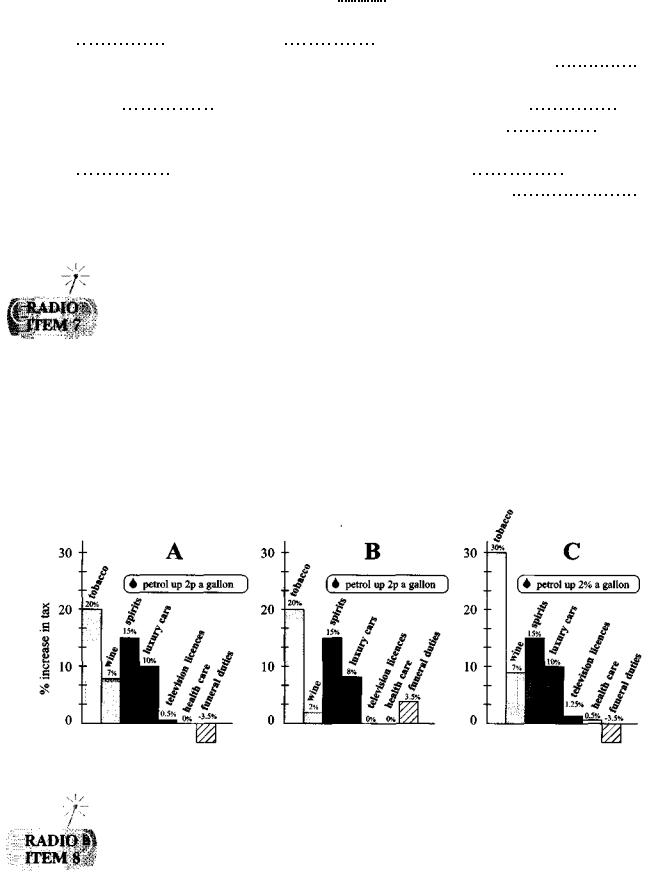
PART 4 - POLITICS IN BRITAIN
4.4GAPFILL: Listen to Radio Item 7 a second time and complete the gaps in the summary of the passage below with the correct word or phrase you hear:
Research by linguists from a top (1) has resulted in a call for an increase in funding for English language training programmes. The research indicates that in certain
(2) areas of Britain, (3) is no longer the dominant language. Mr.
David Thorpe, a government representative, denies that there is a lack of (4)
for English language programmes and has stated on radio that the reason for immigrants
taking (5) |
to learn English is that there has been a slight (6) |
|
age |
|
shift in new migrants to city |
areas, and it is more difficult for (7) |
people |
||
people to |
learn a language. |
Obviously, English will remain the main |
language |
in |
(8) |
because the |
number of immigrants is only (9) |
every |
year. |
Enquiries for English language courses can be made by telephoning: (10)
4.5SPECIFIC INFORMATION: Listen again to Radio Item 7:
i.According to the announcer, what has happened on a large scale in Britain since the 1950s?
ii.What has recent university research called into question?
iii.Who misrepresented the work conducted by a group of university linguists?
iv.According to Mr. Thorpe, what has happened to funding for English language training programmes?
v.What two reasons does Thorpe give to dismiss the suggestion that English will ever become a second language in Britain?
4.6STATISTICS: Study the diagrams below before listening to Radio Item 8. Then choose the diagram that describes the situation you hear on the tape:
Now listen to Radio Item 8 again in detail and answer the following questions:
i.When will the full tax increase be applied to luxury cars?
ii.Why is the government increasing the cost of a television licence?
iii.Which manufacturers of alcoholic beverages are not to be taxed?
iv.How is the government going to pay for its increased spending in health care?
61
202 Useful Exercises for IELTS
4.7 DICTATION PREPARATION:
Look at the following words and phrases taken in sequence from the dictation in Exercise 4.8:
Democracy —• three principles —• representation —• voting rights —• minority views —• tolerated —• developed nations —• economic success —• democratic foundations —• fair government —• stability —• prosperity —• Nevertheless —• government —• arguing —• issue —• rather than —• producing —• result.
What is the likely main idea behind the dictation text?
Use the dictation practice in the following exercise (Exercise 4.8) to practise moving on to the next phrase spoken, even if you missed the previous phrase.
Pay particular attention to listening for the little words (articles, prepositions etc.) which are so easy to miss when taking down a dictation. Also, make sure your work is punctuated correctly.
4.8 D I C T A T I O N : Refer to Dictation 2 on the tape:
(Check your words, spelling and punctuation with the tapescript on page 107.)
4.9 TRUE / FALSE / NOT GIVEN: Listen to Lecture 4 on the tape:
a. Britain and the United States have a similar voting system. |
T |
F |
NG |
|
b. In British elections the winner is the candidate with the most votes. |
T |
F |
NG |
|
c. Proportional representation requires voters to state their |
T |
F |
NG |
|
|
preference for candidates. |
|
|
|
d. |
In Britain, all people must vote. |
T |
F |
NG |
e. |
There are 2 main types of proportional representation voting |
T |
F |
NG |
|
systems. |
|
|
|
f. |
France has a system of proportional representation. |
T |
F |
NG |
g. |
Germany has an old-fashioned voting system. |
T |
F |
NG |
h. |
Italy has a small number of political parties. |
T |
F |
NG |
i. |
Proportional representation requires voters to be well-informed. |
T |
F |
NG |
j. |
The lecturer is in favour of compulsory voting. |
T |
F |
NG |
|
(ANSWERS ON PAGE 119) |
|
|
|
62
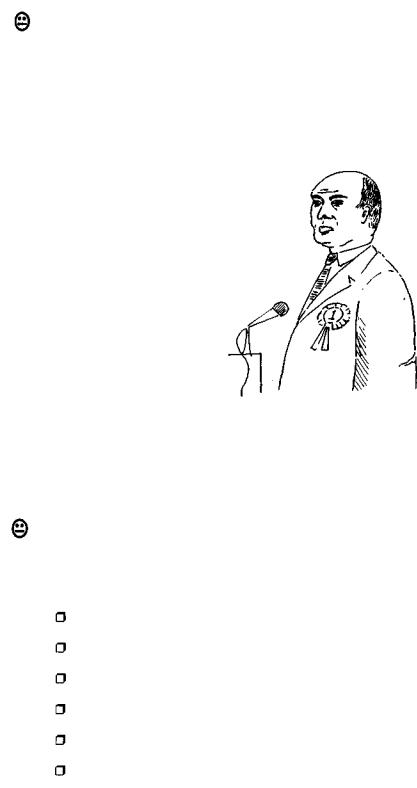
|
|
PART 4 - POLITICS IN BRITAIN |
READING EXERCISES 4.1 - 4.11 |
||
4.1 P R E D I C T I O N : |
Look at the illustration below and the words and phrases |
|
taken from the Reading Passage on the next page. With a partner if possible, try |
||
to predict exactly what is being discussed: |
||
welfare |
societies |
two major choices |
|
||
government spending |
|
strong connections with the unions |
|
|
|
political scene |
|
socialist |
|
|
|
|
|
policies |
fair division of wealth |
|
|
|
|
environmental issues |
the Conservative Party |
|
the Labour Party |
|
|
|
British voters |
|
freedom |
|
|
|
election |
|
conservative, moderate and radical |
less attention is paid to the smaller political parties
4.2P R E - R E A D I N G QUESTIONS: Before reading the text on the following page, work with a partner and ask and answer the questions below. Base your answers on your possible knowledge of the topic:
What system of government do you have in your country? (democratic? good? bad?) Is the party in power in your country conservative, radical, left, or socialist?
How often are elections held in your country?
What do you know about the system of government in your host country? Do you know the names of the 2 major political parties in Britain?
What are the differences between the principles and policies held by the 2 major patties?
|
Now, |
supply the missing first and third letters in the mystery questions below: |
||||
1. |
-h-ch -o-itical |
-a-ty -n |
-r-tain (-n- -u-ope) |
-s |
-o-cerned -i-h -n-ironmental -s-ues? |
|
2. |
-o -o- |
-n-w |
-h- -a-es |
-f -t-er -a-ties -n |
-h- |
-o-ntry -n -h-ch -o- -r- -t-dying? |
63

202 Useful Exercises for IELTS
4.3 SKIMMING: Read the text once for the gist (overall idea) and then in detail:
1 The British political scene is dominated by two major parties that have quite different political agendas. However, the ideological distance between the Labour Party and the Conservative Party has become less marked, and their policies more difficult to tell apart in recent years. In fact, it would be true to say that both parties consist of conservative,
5 moderate and radical elements, and therefore the general public is often perplexed about which party to vote for. Nonetheless, it is usual to find that a British voter will lean towards supporting one of these two parties and remain faithful to that party for life.
The Labour Party's manifest objective is to safeguard the interests of the common working man and woman, and, in effect, give them political representation in Parliament.
10 The Party has always had strong connections with the trade unions, and, before coming to power, was passionately committed to the concept of a welfare society in which people who are less fortunate than others are politically and financially assisted in their quest for a more equitable slice of the economic pie. The main problem is that such socialist agendas are extremely expensive to implement and maintain, even in a comparatively
15 wealthy country with a large working and, hence, taxpaying population base. Welfare societies tend towards bankruptcy unless government spending is kept in check. Fortunately, the present government recognises this, and has resisted reckless spending.
The Conservative Party, on the other hand, argues that the best way to ensure a fair division of wealth in the country is to allow more freedom to create it. This, in turn, means
20more opportunities, jobs created etc., and therefore more wealth available to all. Just how the poor are to share in the distribution of this wealth (beyond being given, at least in theory, the opportunity to create it) is, however, less well understood. Practice, of course, may make nonsense of even the best theoretical intentions, and often the less politically powerful are badly catered for under governments implementing 'free-for-all' policies.
25It is surprising, given the current homogeneity of the two major parties, that less attention than elsewhere in Europe is paid to the smaller political parties such as the Greens and the Liberal Democrats. This may be because British voters distrust parties with platforms based around one or two major current issues alone; the Green Party, for example, is almost
solely concerned with the environment. Moreover, when itcomes to casting a vote, history
30shows that the British public tends to resist change and, thus, the status quo is maintained.
4.4WORD DEFINITIONS: Find the single words inparagraphs 1 and 2 which mean the following:
i. |
controlled or influenced (by) |
v. |
loyal |
ii. |
lists of things to be done |
vi. |
by comparison |
iii. |
(to) make safe |
vii. |
(to) put into practice |
iv. |
puzzled, confused |
viii. equal |
|
4.5TEXT ANALYSIS:
i. Which is the best title for the passage in Exercise 4.3?
a) |
The Labour and Conservative Parties |
c) |
Who the Public Should Vote For |
b) |
British Politics - an Overview |
d) |
A Short History of Politics in Britain |
64

|
|
|
PART 4 - POLITICS IN BRITAIN |
ii. What is the main point of the first paragraph? |
|
||
a) |
British voters are confused about |
c) |
Two political parties dominate |
|
which political party to vote for |
|
the British political scene |
b) |
The policies of the two major British |
d) |
The policies of the two major |
|
political parties are often similar |
|
British parties differ greatly |
iii. Which is the topic sentence of the second paragraph? |
|||
a) |
Sentence number one |
c) |
The last sentence |
b) |
Sentence number two |
d) |
none of the above |
iv. What is the main topic of the final paragraph of the passage?
a) |
current political issues |
c) |
Attitudes of British voters |
b) |
The Green Party |
d) |
The smaller political parties |
v. To what do the following pronouns in the passage refer?
a) |
that |
(line 7) |
C) it |
(line |
22) |
b) |
it |
(line 18) |
d) |
this (line |
27) |
4.6G A P F I L L : The following is a summary of the passage in Exercise 4.3. Choose words/phrases from the box below and refer to the passage to fill the gaps:
Twoparties |
(1) |
the Britishpolitical scene: the LabourPartyandtheConservative |
||||
Party. Although (2) |
|
|
there are many similarities to be seen in theirpolicies, British |
|||
voters tend to stay |
(3) |
|
for life to the party of their choice. The (4) |
|
||
Party, encouraged by |
the |
(5) |
, supports |
a welfare-based (6) |
, |
|
whereas the (7) |
|
|
Party believes that (8) |
to pursue the creation of |
||
wealth ensures that all will eventually benefit from the opportunities created. Oddly,
Britons do not follow Europeans by paying much (9) |
to smaller political |
||||
parties, perhaps because their policies are based onjust a few |
(10) |
political issues. |
|||
|
|
|
|
|
|
supporters |
loyal |
voters |
support |
recently |
now |
opportunities |
Green |
now |
policies |
freedom |
Labour |
politicians |
control |
attention |
unions |
money |
leaning |
Conservative |
welfare |
current |
general public |
majority |
society |
|
|
|
|
|
|
4.7 WORDS & PHRASES WITH SIMILAR MEANINGS: Refer to
the passage in Exercise 4.3, and see page 126 for advice on recognising pattern types. Circle the appropriate pattern type in each case.
1 |
distinguish between |
-> |
(para. |
1) |
|
(Pattern Type: |
T |
2 |
3) |
|
|
|
|
||||||
ii, |
tend towards |
|
|
|
|
(Pattern Type: |
1 |
?, |
3) |
|
|
|
|
|
|||||
iii |
strong links with |
-> |
(para |
2) |
|
( Pattern Type: |
1 |
?, |
3) |
|
|
|
|
||||||
iv. |
population base |
-> |
(para.2) |
|
(Pattern Type: |
1 |
2 |
3) |
|
65
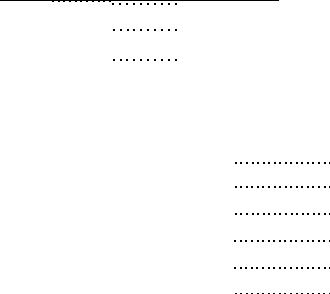
202 Useful Exercises for IELTS
V. the |
idea |
of |
—• |
(para 2) |
(Pattern Type: |
1 |
2 |
3) |
|||||||||||||||||||
|
|
|
|
|
|
|
|
|
|
|
|
|
|
|
|
|
|
|
|
||||||||
vi. helped |
to |
achieve |
—• |
|
|
|
|
|
|
|
|
|
|
|
|
|
|
|
|
|
|
|
|
(Pattern Type: |
1 |
2 |
3) |
|
|
|
|
|
|
|
|
|
|
( Pattern Type: |
|||||||||||||||||
vii. monitored and limited —• |
|
1 |
2 |
3) |
|||||||||||||||||||||||
|
|
||||||||||||||||||||||||||
4.8MATCHING SENTENCE HALVES: Refer to the text in Exercise 4.3 and match the halves of the given sentences together:
a.
b.
c.
d.
e.
f.
g.
j. k. 1. m. n.
o.
p.
Labour and Conservative Party policies ... |
+ |
The two major political parties are composed of ... |
+ |
A large number of working individuals ... |
+ |
|
|
The Conservative Party believes that... |
+ |
|
|
Government spending is likely to ... |
+ |
|
|
A more equal share of the nation's wealth is unlikely to ... |
+ |
... mean bankruptcy in recent years.
... the poor will become less politically powerful.
... are becoming more difficult to distinguish between.
... means more tax can be collected to support the disadvantaged.
... the disadvantaged will benefit from an increase in the country's wealth.
... conservative, moderate and radical groups of politicians.
... increase under policies that encourage a welfare society.
... occur under policies described as 'free-for-all'.
... can afford to pay tax.
... ensure a fair division of wealth under a Conservative Government.
4.9 TRUE / FALSE / NOT GIVEN: Refer to the text in Exercise 4.3.
a. |
Policies in support of the concept of a welfare society are costly. |
T |
F |
NG |
b. |
Britons usually vote for the party they supported early in life. |
T |
F |
NG |
c. The Labour Party was formed by the trade unions. |
T |
F |
NG |
|
d. |
Radical groups are only found within the Labour Party. |
T |
F |
NG |
e. The Conservative Party was formed after the Labour Party. |
T |
F |
NG |
|
f. Welfare-based societies invariably become bankrupt. |
T |
F |
NG |
|
g. |
According to the author, theories do not always work in practice. |
T |
F |
NG |
h. |
Some British voters are confused about who to vote for. |
T |
F |
NG |
i. |
The Green Parties are a lot smaller in European countries. |
T |
F |
NG |
j. |
The smaller parties are only concerned about the environment. |
T |
F |
NG |
66

PART 4 - POLITICS IN BRITAIN
4.10 SHORT-ANSWER QUESTIONS: Refer to the text in Exercise 4.3.
1.Name the two groups whose interests the Labour Party looks after: 1 2
ii.Why are socialist policies more costly in countries with a small working population?
iii.What must governments limit to safeguard welfare societies from bankruptcy?
iv.According to the author, who suffers under policies designed solely to create wealth?
V. What do the smaller political parties' focus on?
vi. How many political parties are named in the reading passage?
4.11WORDSEARCH: All words are taken from the Part 4 Listening and Reading Passages. Match the words and meanings in boxes A and B on the left. Next, locate the words in the wordsearch grid. (Answers to the clues are upside down and back-to-front under the grid - hold them up to a mirror):
A
B
l. "to pay |
" (n) |
..e.. |
2.foundation (n)
3.money, riches, large possessions (n)
4.faithful (adj)
5.search (n)
6.liberty, independence (n)
a. (E L A W H T) b. (E T U Q S)
c.(L L Y O A)
d.(A E S B)
e.(T O I N E T A N T)
f.(M E R E F O D)
7.business, skilled craft (n/v)
8.those born overseas who live permanently abroad (n)
9.of a central system of government (adj)
10.alone, accompanied (adv)
11.completely controlled (adj)
12.fictitious thing or idea (n)
g. (O I E A M D D N T)
h.(G T S A I M R N)
i.(Y L L O S E)
j . (T D E A R)
k.(T M H Y)
1.(E A E D L R F)
D |
H |
L |
A |
Y |
0 |
L |
S |
N |
|
|
|
|
|
|
|
|
|
V |
E |
T |
X |
C |
T |
T |
0 |
P |
|
|
|
|
|
|
|
|
|
M |
L |
T |
L |
R |
N |
I |
L |
G |
|
|
|
|
|
|
|
|
|
B |
0 |
A |
A |
A |
T |
M |
E |
T |
|
|
|
|
|
|
|
|
|
A |
P |
D |
R |
N |
E |
N |
L |
M |
|
|
|
|
|
|
|
|
|
S |
E |
G |
E |
E |
I |
W |
Y |
Y |
|
|
|
|
|
|
|
|
|
E |
I |
T |
X |
E |
D |
M |
M |
T |
|
|
|
|
|
|
|
|
|
M |
T |
Z |
U |
J |
R |
E |
0 |
H |
|
|
|
|
|
|
|
|
|
A |
T |
S |
E |
U |
Q |
F |
F |
D |
|
|
|
|
|
|
|
|
|
(ANSWERS ON PAGE 119)
67

202 Useful Exercises for IELTS
WRITING EXERCISES 4.1 - 4.7
4.1IDENTIFYING THE MAIN FEATURES: Writing Task 1:
Identify 8 key features of the information given in the graph for the TWO companies Acme Sports Cars and Branson Motors. (Note that you are not asked to include information about Curtis Car Mart.) Then complete the sentences below the graph.
The graph below shows the monthly profits of 3 British companies in the car retail industryfor the 2000 financial year.
Write a reportfora university lecturer comparing theperformance ofAcmeSports Cars and Branson Motorsfor the period given.
2000 Financial Year
MAIN FEATURES:
|
monthly profit began higher than that of |
|
2. |
By the end of the financial year |
monthly profit was |
|
three times what it was at the beginning of the year ... |
|
3. |
... whereas the monthly profit of |
had almost halved. |
4. |
The worst quarter for Acme Sports Cars was from |
to |
5. |
The best two months for Branson Motors were |
and |
6. |
The profit situation for Branson Motors fluctuated between |
and |
7.The introduction of the luxury goods tax badly affected
8.The monthly profit of Acme Sports Cars peaked at
4.2SENTENCE INSERTION: Practice for Writing Task 1:
Insert the statistical information from the graph in Exercise 4.1 into the blank spaces in the model answer on the following page and in the 'missing sentences' labelled 'a' to 'd'. Then complete the answer by inserting the 'missing' sentences, and finally, add the verb and adverb phrases in the shaded spaces A - D.
68
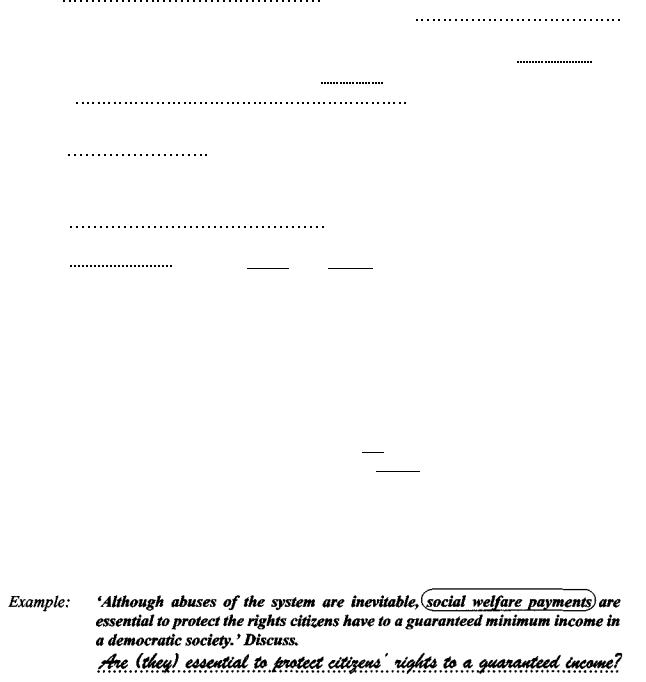
PART 4 - POLITICS IN BRITAIN
WRITING TASK 1 - Model Answer:
para. l |
(i) |
|
|
The former was making almost twice the profit |
|||||
|
at the beginning than at the end of the financial year, (ii) |
|
|
||||||
para, 2 |
During the first quarter, Acme Sports Cars' monthly profit |
(A). |
from |
||||||
|
(1) |
|
to (2) |
, but |
(B) |
to (3) |
by the |
end of June. |
|
|
|
|
|
|
|
|
|
|
|
|
(iii) |
|
|
|
|
|
|
|
|
para. 3
para. 4
Due |
to the introduction |
of a luxury goods tax, Acme Sports Cars' monthly profit |
||||||||
(C) |
|
during the second quarter from (4) |
to only (5) |
|
, whereas |
|||||
|
|
|
|
|
|
|
|
|
|
|
that |
of Branson Motors |
continued to rise, peaking at just over |
(6) |
|
|
by the end of |
||||
September. |
|
|
|
|
|
|
|
|
|
|
(iv) |
|
At the beginning of the last quarter, a boost in |
||||||||
the economy meant the monthly profit of both Acme Sports Cars and Branson Motors
(D) to (7) and (8) respectively by the financial year's end.
|
fell dramatically |
gradually increased |
decreased |
slightly |
|
rose sharply |
||||||||
a. |
In the third quarter, Acme Sports Cars' monthly profit increased steadily to (9) |
|
|
and |
||||||||||
|
remained stable, while Branson Motors' monthly profits fluctuated between just over |
|||||||||||||
|
(10) |
and (11) |
. |
|
|
|
|
|
|
|
|
|
||
|
|
|
|
|
|
|
|
|
|
|
|
|
||
b. |
Branson Motors' monthly profit, however, doubled from |
(12) |
|
to (13) |
. |
|
||||||||
|
|
|
|
|
|
|
|
|
|
|
|
|
|
|
c. The graph shows the four quarters of the (14) of Acme Sports Cars and Branson Motors for (15)
financial year and the monthly profit months.
d. There was a three-fold increase in the latter's monthly profit over the same period.
4.3 THE TOPIC & THE TOPIC QUESTION: Writing Task 2:
Circle the topic and write the topic question as a 'wh' or yes/no question:
a.The government is ultimately responsible for making the streets safe. Stronger gun laws should be in force to protect all citizens. How far do you agree or disagree with this statement?
b.The only way to reduce the rising number of road accidents is for a total ban on drinking while driving. Do you agree or disagree? Make other recommendations.
c.Most British people believe they enjoy and have the right to free speech. How important is it to have the right to say or write whatever you wish in society?
69
